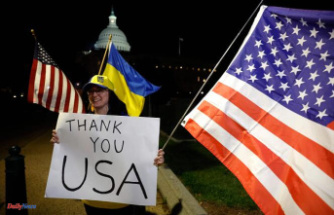The EU is taking a step towards Russia in the dispute over blocked wheat deliveries. As part of a new sanctions package, in which the EU bans gold from Russia, for example, the European Council also grants relief. This was announced by the EU on Thursday. Trade with some state-owned companies will be facilitated to facilitate wheat exports from Russia. The EU also enables maintenance in civil aviation. The Aeroflot share then rose.
Since the start of the Ukraine war, the global wheat price has risen significantly. At first, the traders feared that the harvests from the Ukraine could be almost completely lost because of the war. This fear has been shattered: farming outside the war zone continues.
But exports from Russia also weakened. There was a dispute about the causes: while the EU accused the Kremlin of using hunger as a weapon and denied the effects of the sanctions on the wheat trade, Moscow saw difficulties with exports and payments due to the sanctions.
Apparently the EU is now giving in to some extent. "None of the measures adopted today or in the past affect in any way trade in agri-food products, including wheat and fertilizers, between third countries and Russia," the EU said in the statement. Nevertheless, the simplifications would now be possible, which should also simplify the delivery of Russian oil to third countries.
There is also progress in the dispute over blocked ports from Ukraine. According to the Ukrainian government, a solution under UN control emerged earlier this week that would allow the ports to be reopened to merchant ships. Ukraine had mined its own ports to prevent attacks by Russian naval forces.
More wheat is already flowing out of the country via alternative routes. In June, exports were 22 percent higher than in the previous month - but still 44 percent below the previous year's level, Ukrainian statisticians said. The European railways are pushing exports by rail, and more use is to be made of the Danube.
The current harvest is also going better than feared. The authorities predict that Ukraine will produce up to 52 million tons of wheat in the current harvest. The problem of full silos is also addressed. International partners would supply plastic bag silos, each capable of storing 200 tons of grain for 12 to 17 months, Deputy Agriculture Minister Taras Vysotskyi said. The huge sacks would be distributed from August.
With regard to aviation, the EU announced that the maintenance of aircraft technology would be allowed again. In addition, access to the Russian legal system is made easier.
In Russia, the EU's concessions meet with approval. “The EU will lift the ban on the delivery of aviation goods to Russia,” headlines the business daily Kommersant on its website. This enables Aeroflot to comply with international safety regulations. So far there have been fears that the state airline will have to remain on the ground in the foreseeable future.
Russian consumers still have to limit themselves. Also on Thursday, the Japanese Suntory group announced that it had sold its Russian business with brands like Jim Beam to local management.
"Everything on shares" is the daily stock exchange shot from the WELT business editorial team. Every morning from 7 a.m. with our financial journalists. For stock market experts and beginners. Subscribe to the podcast on Spotify, Apple Podcast, Amazon Music and Deezer. Or directly via RSS feed.












